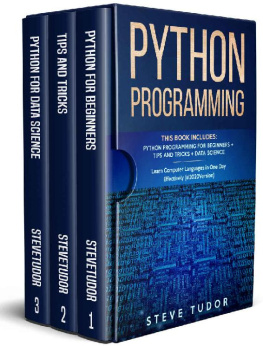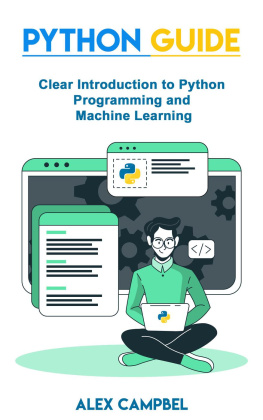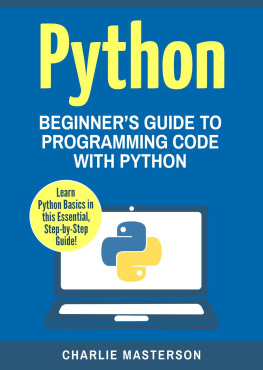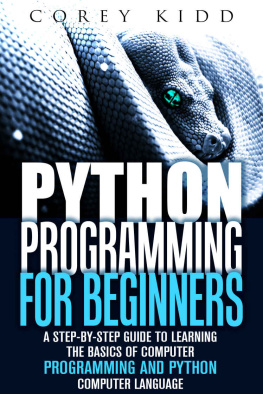Steve Tudor - Python Programming: This Book Includes: Python Programming For Beginners + Tips And Tricks + Data Science Learn Computer Languages in One Day Effectively (#2020 Version)
Here you can read online Steve Tudor - Python Programming: This Book Includes: Python Programming For Beginners + Tips And Tricks + Data Science Learn Computer Languages in One Day Effectively (#2020 Version) full text of the book (entire story) in english for free. Download pdf and epub, get meaning, cover and reviews about this ebook. year: 2019, genre: Computer. Description of the work, (preface) as well as reviews are available. Best literature library LitArk.com created for fans of good reading and offers a wide selection of genres:
Romance novel
Science fiction
Adventure
Detective
Science
History
Home and family
Prose
Art
Politics
Computer
Non-fiction
Religion
Business
Children
Humor
Choose a favorite category and find really read worthwhile books. Enjoy immersion in the world of imagination, feel the emotions of the characters or learn something new for yourself, make an fascinating discovery.
- Book:Python Programming: This Book Includes: Python Programming For Beginners + Tips And Tricks + Data Science Learn Computer Languages in One Day Effectively (#2020 Version)
- Author:
- Genre:
- Year:2019
- Rating:5 / 5
- Favourites:Add to favourites
- Your mark:
- 100
- 1
- 2
- 3
- 4
- 5
Python Programming: This Book Includes: Python Programming For Beginners + Tips And Tricks + Data Science Learn Computer Languages in One Day Effectively (#2020 Version): summary, description and annotation
We offer to read an annotation, description, summary or preface (depends on what the author of the book "Python Programming: This Book Includes: Python Programming For Beginners + Tips And Tricks + Data Science Learn Computer Languages in One Day Effectively (#2020 Version)" wrote himself). If you haven't found the necessary information about the book — write in the comments, we will try to find it.
Steve Tudor: author's other books
Who wrote Python Programming: This Book Includes: Python Programming For Beginners + Tips And Tricks + Data Science Learn Computer Languages in One Day Effectively (#2020 Version)? Find out the surname, the name of the author of the book and a list of all author's works by series.
Python Programming: This Book Includes: Python Programming For Beginners + Tips And Tricks + Data Science Learn Computer Languages in One Day Effectively (#2020 Version) — read online for free the complete book (whole text) full work
Below is the text of the book, divided by pages. System saving the place of the last page read, allows you to conveniently read the book "Python Programming: This Book Includes: Python Programming For Beginners + Tips And Tricks + Data Science Learn Computer Languages in One Day Effectively (#2020 Version)" online for free, without having to search again every time where you left off. Put a bookmark, and you can go to the page where you finished reading at any time.
Font size:
Interval:
Bookmark:
Python Programming
This Book Includes:
Python Programming For Beginners + Tips And Tricks + Data Science
Learn Computer Languages in One Day Effectively (#2020 Version)
Steve Tudor
Text Copyright
All rights reserved. No part of this guide may be reproduced in any form without permission in writing from the publisher except in the case of brief quotations embodied in critical articles or reviews.
Legal & Disclaimer
The information contained in this book and its contents is not designed to replace or take the place of any form of medical or professional advice; and is not meant to replace the need for independent medical, financial, legal or other professional advice or services, as may be required. The content and information in this book has been provided for educational and entertainment purposes only.
The content and information contained in this book has been compiled from sources deemed reliable, and it is accurate to the best of the Author's knowledge, information and belief. However, the Author cannot guarantee its accuracy and validity and cannot be held liable for any errors and/or omissions. Further, changes are periodically made to this book as and when needed. Where appropriate and/or necessary, you must consult a professional (including but not limited to your doctor, attorney, financial advisor or such other professional advisor) before using any of the suggested remedies, techniques, or information in this book.
Upon using the contents and information contained in this book, you agree to hold harmless the Author from and against any damages, costs, and expenses, including any legal fees potentially resulting from the application of any of the information provided by this book. This disclaimer applies to any loss, damages or injury caused by the use and application, whether directly or indirectly, of any advice or information presented, whether for breach of contract, tort, negligence, personal injury, criminal intent, or under any other cause of action.
You agree to accept all risks of using the information presented inside this book.
You agree that by continuing to read this book, where appropriate and/or necessary, you shall consult a professional (including but not limited to your doctor, attorney, or financial advisor or such other advisor as needed) before using any of the suggested remedies, techniques, or information in this book.
Table of Contents
PYTHON PROGRAMMING
The Practical Beginner's Guide to Learn Python Programming in One Day Step-by-Step (#2020 Updated Version | Effective Computer Programming)
Steve Tudor
Python is basically an incredibly useful and powerful language. Its present essentially everywhere. Everything from the scripting side of video games (or the video games themselves) to intensive server-side web applications to the plethora of deep and responsive desktop applications that have been built with it.
When should you use Python? The answer depends upon exactly what youre going to do. But since youre a beginner, I say you should learn anyway.
As you continue to grow as a programmer after this book, youre going to learn when you should and shouldnt use Python just as a matter of intuition. Python is an absolutely fantastic language, but the place where it fails is when you have to get extremely close to a computers hardware or write incredibly efficient programs. In these areas, Python doesnt excel.
However, thats not to say it doesnt have its perks. In fact, Id say thats one of the few places that Python falls flat. And what it lacks there, it makes up for in other areas. For example, development time in Python is generally extremely low in comparison to other languages. This is super easy to illustrate. Compare the following excerpts of code, the first from C++, the second from Java, and the last from Python.
Learning the ABCs of anything in this world, is a must. Knowing the essentials is winning half the battle before you get started. Its easier to proceed when you are equipped with the fundamentals of what you are working on.
In the same manner that before you embark on the other aspects of python let us level off the basic elements first. You need to learn and understand the basics of python as a foundation in advancing to the more complicated components. This fundamental information will greatly help you as you go on and make the learning experience easier and enjoyable.
Familiarize yourself with the Python Official Website https://www.python.org/. Knowing well the website of python would give you the leverage in acquiring more information and scaling up your knowledge about python. Also, you can get the needed links for your work
Learn from Python collections. Locate python collections such as records, books, papers, files, documentations and archives and learn from it. You can pick up a number of lessons from these, and expand your knowledge about Python. There are also tutorials, communities and forums at your disposal.
Possess the SEO Basics. Acquire some education on Search Engine Optimization so you can interact with experts in the field and improve your python level of knowledge. That being said, here are the basic elements of Python.
With Guido van Rossum at the helm of affairs, Python has witness three versions over the years since its conception in the '80s. These versions represent the growth, development, and evolution of the scripting language over time, and cannot be done without in telling the history of Python.
The Versions of Python Include The Following;
Python 0.9.0:
The first-ever version of Python released following its implementation and in-house releases at the Centrum Wiskunde and Informatica (CWI) between the years 1989 and 1990, was tagged version 0.9.0. This early version which was released on alt.sources had features such as exception handling, functions, and classes with inheritance, as well as the core data types of list, str, dict, among others in its development. The first release came with a module system obtained from Module-3, which Van Rossum defined as one of the central programming units used in the development of Python.
Another similarity the first release bore with Module-3 is found in the exception model which comes with an added else clause. With the public release of this early version came a flurry of users which culminated in the formation of a primary discussion forum for Python in 1994. The group was named comp.lang.python and served as a milestone for the growing popularity of Python users.
Following the release of the first version in the 29th of February, 1991, there were seven other updates made to the early version 0.9.0. These updates took varying tags under the 0.9.0 version and were spread out over nearly three years (1991 to 1993). The first version update came in the form of Python 0.9.1, which was released in the same month of February 1991 as its predecessor. The next update came in the autumn period of the release year, under the label Python 0.9.2. By Christmas Eve of the same year (1991) python published its third update to the earliest version under the label Python 0.9.4. By January of the succeeding year, the 2nd precisely, a gift update under the label Python 0.9.5 was released. By the 6th of April, 1992, a sixth update followed named, Python 0.9.6. It wasn't until the next year, 1993, that a seventh update was released under the tag Python 0.9.8. The eighth and final update to the earliest version came five months after the seventh, on the 29th of July, 1993, and was dubbed python 0.9.9.
These updates marked the first generation of python development before it transcended into the next version label.
Font size:
Interval:
Bookmark:
Similar books «Python Programming: This Book Includes: Python Programming For Beginners + Tips And Tricks + Data Science Learn Computer Languages in One Day Effectively (#2020 Version)»
Look at similar books to Python Programming: This Book Includes: Python Programming For Beginners + Tips And Tricks + Data Science Learn Computer Languages in One Day Effectively (#2020 Version). We have selected literature similar in name and meaning in the hope of providing readers with more options to find new, interesting, not yet read works.
Discussion, reviews of the book Python Programming: This Book Includes: Python Programming For Beginners + Tips And Tricks + Data Science Learn Computer Languages in One Day Effectively (#2020 Version) and just readers' own opinions. Leave your comments, write what you think about the work, its meaning or the main characters. Specify what exactly you liked and what you didn't like, and why you think so.





